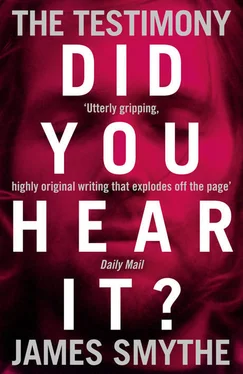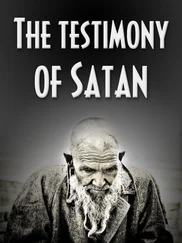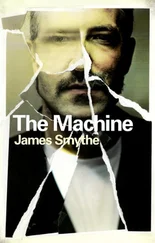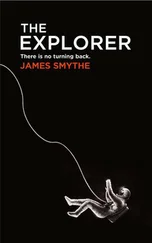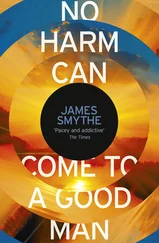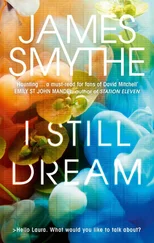James Smythe - The Testimony
Здесь есть возможность читать онлайн «James Smythe - The Testimony» — ознакомительный отрывок электронной книги совершенно бесплатно, а после прочтения отрывка купить полную версию. В некоторых случаях можно слушать аудио, скачать через торрент в формате fb2 и присутствует краткое содержание. Город: London, Год выпуска: 2012, ISBN: 2012, Издательство: Blue Door, Жанр: Фантастика и фэнтези, Триллер, на английском языке. Описание произведения, (предисловие) а так же отзывы посетителей доступны на портале библиотеки ЛибКат.
- Название:The Testimony
- Автор:
- Издательство:Blue Door
- Жанр:
- Год:2012
- Город:London
- ISBN:9780007467723
- Рейтинг книги:4 / 5. Голосов: 1
-
Избранное:Добавить в избранное
- Отзывы:
-
Ваша оценка:
- 80
- 1
- 2
- 3
- 4
- 5
The Testimony: краткое содержание, описание и аннотация
Предлагаем к чтению аннотацию, описание, краткое содержание или предисловие (зависит от того, что написал сам автор книги «The Testimony»). Если вы не нашли необходимую информацию о книге — напишите в комментариях, мы постараемся отыскать её.
What would you do if the world was brought to a standstill? If you heard deafening static followed by the words, ‘My children. Do not be afraid’?
Would you turn to God? Subscribe to the conspiracy theories? Or put your faith in science and a rational explanation?
The lives of all twenty-six people in this account are affected by the message. Most because they heard it. Some because they didn’t.
The Testimony
The Testimony — читать онлайн ознакомительный отрывок
Ниже представлен текст книги, разбитый по страницам. Система сохранения места последней прочитанной страницы, позволяет с удобством читать онлайн бесплатно книгу «The Testimony», без необходимости каждый раз заново искать на чём Вы остановились. Поставьте закладку, и сможете в любой момент перейти на страницу, на которой закончили чтение.
Интервал:
Закладка:
Dhruv Rawat, doctor, Bankipore
I forget now why they were filming in the region before the static, but they had video cameras, full crews. All the children had run over to see what they were doing, standing by the catering tables – tables of food! In that heat! – and peering through, desperate to be on the camera. That was always the way, when the cameras were in town: all the children wanted to be in on it. They knew that they would probably never even see what they were being filmed for, but that didn’t stop them. (Somebody, I forget who, said that the glare of the spotlight hits the people even on the streets of India, when they’re already blinded by the sun. It must have been somebody intelligent, but I cannot for the life of me remember who.) I remember when I was a child, and the first time the television cameras came and filmed us all for the British news, and we didn’t know what they were. That sounds like a lie, I know, but I was very young – only four or five, young enough to not know any better, and we did not have a television in my house, of course – and my friends and I did not believe that they could film us, put us on their screens as they did, show us what we looked like there. It was fascinating! People say, what moments made you decide to change your life? That was one for me, because they were so glamorous. There was one lady with them, wearing a long white skirt and a shirt that clung to her body like I had never seen, and a hat that was thick and white and nearly covered her entire face in shade. I went over to her, and she was the one who told us what they were doing there, and I thought, Some day I’ll persuade them to film me. After that, my plan, of course, was to leave Bankipore and go somewhere else – of course, dreaming of Mumbai – and to be on camera. I never went, because nobody ever does. Instead, I worked hard at school, and then went to Bangalore and I became a doctor, and then I moved back to Bankipore, because I thought that I could do some good here. That is what all my doctor friends said, if they weren’t going overseas; they were going home to do some good. Then, when the static happened and the cameras were there, I was the person standing closest to them, trying to see what they were there for. The woman talking to the camera, I recognized her from the international news television channel they showed in the hotel restaurant-bar – I lived out of hotels for a while. I was outside when the static happened, and the woman came over to me, saw that I was smartly dressed – I wore a shirt and tie to work every day, because it established a rule from the second I saw a patient, that I was a doctor, an authority – and she asked me if I heard the static as well; she wanted to check that it wasn’t coming from their equipment. I told her, Yes, of course I did.
Is it a noise that’s common here? she asked. A nearby factory or something? I said, No, I have never heard it before. I asked some of the children – who were over by my offices, by the wall, lined up as if they were waiting for their turn to be spoken to by the woman – and they said that they had not heard it before either. I am sorry, I told the woman. Will you say something about it on camera, just in case? she asked, and I said, Of course I will. She went back to her crew, who were all Indian as well, but they weren’t local, because nobody from Bankipore had that sort of equipment (that I knew of), and they all came over, set up in front of me. What do you think it was? she asked me, and I said, seeing myself reflected in the camera lens, that I thought it was probably nothing, because we couldn’t explain what it was. I am a man of science; there has to be an explanation for me to believe it, I said. Thank you, she said, and she moved on.
Elijah Said, prisoner on Death Row, Chicago
I was asleep when I first heard the static, in my cot. They called them cots, like we were babies. Lots of people in there didn’t sleep, defiantly staying awake, rattling anything they could against the bars, or howling their way through the nights. They would try to make sure that nobody could forget who they were, or where they were. I am a murderer, their actions called out, you would do well to remember who it is that I am, what I am capable of. It is within me to commit horrors upon you, and for that reason, I do not sleep when you tell me to; I sleep on my own timescale. On the corridor, we didn’t get exercise like the rest, didn’t get library time. Our meals were visited upon us, delivered on trays, always hot, always neatly plated, our cutlery thin shards of blunt plastic that was counted back when we were finished with our meals. If we tried anything – and I did not, but I watched as others did, unrepentant in their drive for freedom, or revenge – the cutlery was removed completely, and the prisoner ate with their hands, like a primate, free yet ignorant. The guards would laugh as they spooned potato into their mouths, with the gravy dripping through their fingers; that’s your punishment, they would say. No, I say: their punishment was both being there in the first place, behind those bars; and also would be delivered by Allah upon their death, a death that they entirely deserved for the crimes that they had committed toward their fellow man. They howled in the nights, dogs, desperate for their creator to put them out of their misery.
I could sleep through the catcalling, the constant abuse; but when a noise was unknown it would rouse me from even the deepest sleep. The static had us all on our feet, demanding to know what was happening. The guards ignored us, and left us alone. That was the first time I could remember the corridor being left unguarded; no matter how loud the shouts came for the next few minutes, the guards didn’t return, and we were briefly free from their watch to do as we pleased within those confines; for my part, I was on my musalla, praying.
The guards returned after a few minutes, when I was still praying, and they put the lights on along the corridor, demanded that we turn out. They were on edge, frantic as mice. As always, I stood back, allowed them into my cell. As always, they invaded my privacy, their trust of my people so low that they felt no shame in their intrusions. They searched under my cot, in the metal basin they called a toilet, around my person. They searched my mat, which they were forbidden to do, and they provoked me, prodded me like I was cattle, all to get a reaction. You don’t say much, do you? they asked, and I did not reply: No, I do not.
When they were gone, and the corridor was quiet again – a comparative quiet, a quiet that is still loud with shouting, but constant, our own personal take on the tranquil – my neighbour, a murderer by the name of Finkler, spoke to me. Hey, brother, he said, because he called everybody of colour that name – as if he were saying, I am one of you, the oppressed, the downtrodden, we are in this together – you know what that was? No, I replied. He carried on, even though the lights were now out, and the guards demanded silence from us: What d’you reckon it was, then? Allah will deliver answers, I said. He went quiet. Even in here he knew I could still kill him, if he didn’t go at the hands of the state first.
WE’RE HAVING PROBLEMS
Phil Gossard, sales executive, London
As soon as the TV broadcasts came back online, we expected there to be answers. There weren’t any. They actually only seemed to know as much as we did. In some ways, that was a relief, actually. I think some people expected the noise to be a signal, a warning. Some people thought it meant that we were being attacked, and who could blame them for thinking that? Biological, that was the biggest threat, but anything else, really. Nuclear, Semtex, we didn’t care. We were all so on edge because it had been what, ten years since an attack? And there were constant whispers about terrorists holing themselves up, waiting for chances. I mean, there were rumours about everything, actually, especially about the new American president (that he was, despite his campaign promises, actually more anti-war than even Obama was, a couple of terms back) and about the threat from Iran. When it was done we left the windows and switched the telly on, and it had that We’re Having Problems screen on the BBC – Aren’t we just, I said out loud, but nobody laughed – and then a minute or so later it kicked back in. It wasn’t a regular newsreader – they were interrupting whatever had been on previously, so I suppose it was whoever they had to hand, dragged up from Newsround like it was work experience week – and then they reported what had happened, that we all heard something. They went to somebody outside BT Tower, asking for opinions. Everybody they spoke to was just confused. It was strange, actually; that corner is usually a flow of people moving between Tottenham Court Road and Oxford Street, but nobody was moving. They were just milling around, looking terrified or elated or whatever. Bemused, that’s the word. Most of them looked bemused.
Читать дальшеИнтервал:
Закладка:
Похожие книги на «The Testimony»
Представляем Вашему вниманию похожие книги на «The Testimony» списком для выбора. Мы отобрали схожую по названию и смыслу литературу в надежде предоставить читателям больше вариантов отыскать новые, интересные, ещё непрочитанные произведения.
Обсуждение, отзывы о книге «The Testimony» и просто собственные мнения читателей. Оставьте ваши комментарии, напишите, что Вы думаете о произведении, его смысле или главных героях. Укажите что конкретно понравилось, а что нет, и почему Вы так считаете.
